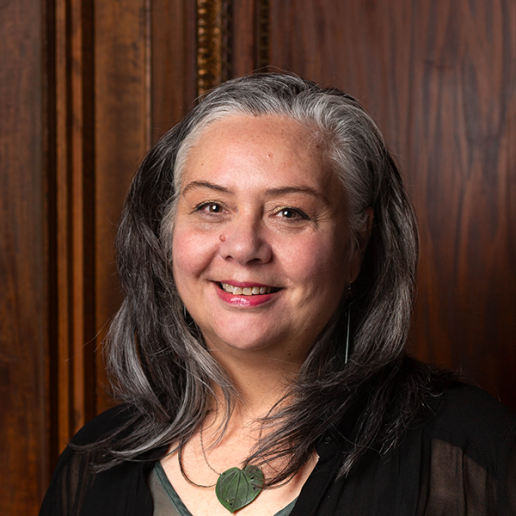Placement: National Indian Health Board
Mentor: Stacy A. Bohlen, CEO, National Indian Health Board
Co-mentor: Bette Jacobs, Ph.D., Professor, Department of Health Systems Administration, Distinguished Scholar, O’Neill Institute for National and Global Health Law, Georgetown University
Project: Transforming Health Systems: A Comparison of Indigenous-Informed Legislation and Policy Driving Health System Reform in Turtle Island, Hawaii, and Aotearoa
Louise Davis Kuraia, B.A., LL.B., is a 2023–24 Aotearoa New Zealand Harkness Fellow in Health Care Policy and Practice. She is an indigenous wahine (woman) of the Ngāpuhi, Ngāti Manu, and Kōhatutaka tribes of the far north of the country who lives amongst her whānau (family) and works from her ancestral homelands of Te Tai Tokerau Northland. Kuraia is the chief advisor, Māori Crown Relations in the Māori Health Directorate of the Ministry of Health, who are chief stewards of the health system and policy advisors to the Minister of Health. She previously worked for more than 20 years in tribally owned partnership, primary and community health organizations to advance Māori health equity and address systemic racism through giving practical effect to the rights and responsibilities of Māori and the Crown under the Treaty of Waitangi, New Zealand’s founding document. Kuraia has served on multiple national health advisory and strategy groups, bringing her extensive expertise and experience in applying Treaty principles of partnership, equity, self-determination, options, and active protection of Māori knowledge to drive change in complex systems. She is a widowed māmā (mother) of three fine young men and is excited to bring her whole self to the Harkness experience.
Project Overview: On July 1, 2022, the Pae Ora (Healthy Futures) Act came into force, enacting a once-in-a-generation health system transformation in Aotearoa (New Zealand) that centers Te Tiriti o Waitangi (the Treaty of Waitangi, the foundational document of New Zealand) principles of Māori (indigenous people of Aotearoa) health equity, Māori decision-making and self-determination, and partnership between Māori and the Crown (represented by the New Zealand government) at the heart of structural and policy reform.
This research will look at select health law and indigenous-informed health policy in the United States and New Zealand with key objectives seeking to understand how indigenous rights and perspectives of health and well-being can drive systems change and reform; to enable indigenous expressions of self-determination and decision-making; to empower authentic partnerships and power-sharing relationships between indigenous people and government; and to improve indigenous health equity through the dismantling of systemic racism in health care policy and practice.
Indigenous worldview-driven qualitative methodologies will be used to gather stories through a combination of literature review and on-the-ground case studies and key informant interviews with indigenous lawmakers and health policy leaders. Based in Washington D.C., the work will be guided by the National Indian Health Board (NIHB) with joint mentorship from Stacy A. Bohlen (Sault Ste. Marie Tribe of Chippewa Indians) and Bette Jacobs (Cherokee Nation).
